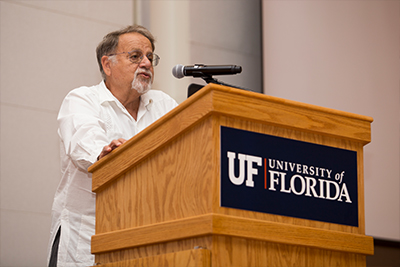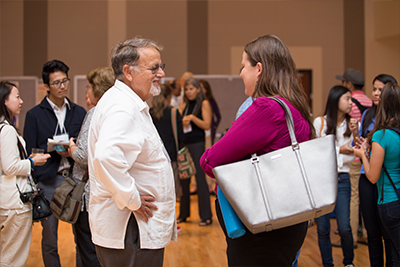By Jessica Pardo, Communications Specialist, SWS

World-renowned tropical soils scientist and World Food Prize laureate, Dr. Pedro Sanchez, has joined the University of Florida’s Soil and Water Sciences Department as a Research Professor.
Pedro Sanchez’s roots are deep in the agricultural industry. He grew up in on his family’s farm right outside of Havana, Cuba. His father was an agriculturist and worked with Cuban farmers to increase productivity with fertilizers.
His first interaction with the University of Florida (UF) was at the age of 7, when he visited the UF/IFAS Tropical Research and Education Center with his father in Homestead, Florida.
“I distinctly remember that trip,” Sanchez said. “They were interchanging germplasm between mangos to create the Super Hayden Mango, a large mango that can feed an entire family and was a significant cash crop in Cuba.”
Sanchez returned from that trip with a heightened interest in agriculture and crop science. He finished high school in Cuba and decided to attended Cornell University, his father’s alma mater. It was at Cornell that Sanchez earned his bachelor’s degree in Agronomy, and his master’s degree and PhD in Soil Science.
Little did he know, that years down the road, he would end up at the university that fueled his passion for agriculture when he was just a boy.
Here at UF, Dr. Sanchez serves as a Research Professor of Tropical Soils in the Soil and Water Sciences Department and is a core faculty member of the Institute for Sustainable Food Systems, which is a team of UF/IFAS researchers who are working to improve the quality of life in Florida and throughout the world by studying and improving the Global Food System.
Sanchez said that when it comes to his new position here at UF, he is most excited about the opportunity of giving back, and he plans to do so through our students.

“I’ve reached a point in my career where I have learned so much from people all over the world and I’d like to share that knowledge and experience,” Sanchez said. “I plan on doing so through my new soils book and, of course, teaching.”
Sanchez is currently working on the 2nd edition of his tropical soils book, which he plans to use in his courses. As a research professor and philanthropist who is constantly traveling, Sanchez said he squeezes in time to work on the text whenever he can.
“I may work on it while on a private plane to Malawi, or while working in the fields in Cuba,” Sanchez said. “When it is completed, the chapters will be reviewed by my colleagues and will be translated into several languages.”
Sanchez is visibly excited about his opportunity to share his knowledge and experience with SWS students.
“I’d like students to answer some of the questions that have arisen while writing my tropical soils book – a possible research opportunity for graduate students,” Sanchez said. “I’d also like to possibly start a tropical soils seminar to link UF students with African and Cuban students via field courses.”
Sanchez has worked in 68 countries during his career – 40 of those countries are in the tropics. But he has most fervently worked toward the agricultural independency of Cuba.
“Cuba imports 70% of their food at a very high cost and they have over one million acres of unused, good quality farm land,” Sanchez said.
Sanchez is hopeful that change is on the horizon for Cuban agriculture.
“The potential is there,” Sanchez said.
“There is a letter of intent currently pending between UF and the Cuban Ag Minister,” Sanchez said. “We hope to work in the initial stages of the food chain (in Cuba), beginning with services such as soil testing, then following up with production.”
Sanchez’ environmental and food security plan for Cuba has four core components:
- Seed production
- Quantify soil dynamics and the effects of nutrient pollution for food and environmental security
- Water/climate change predictions for Cuba, specifically how to use irrigation and soil moisture
- Analysis of Cuban data on soil fertility
“People say why Cuba? Well, It’s in my DNA,” Sanchez said. “I love Cuba.”
Sanchez is committed to helping universities in Cuba train young people to become agriculturists, making the profession more appealing and accessible – and he is banking on UF’s support.
“I led a UF team to Cuba last June to start a new program there,” Sanchez said.
Sanchez was previously Director of the Agriculture and Food Security Center and Senior Research Scholar at Columbia University’s Earth Institute. While there, he worked extensively in tropical Africa where he used soil science to double (triple in some areas) food production in 12 countries of Africa which were starving. For a detailed look at his groundbreaking work in Africa, take a look at Dr. Sanchez’s keynote speech from the 17th Annual Soil and Water Sciences Research Forum.
Sanchez plans to continue working to improve the soil in tropical Africa while at UF, experimenting with the SoilDoc testing kit – a soil test kit which can be used on the farm without electricity or distilled water.
Sanchez has received honorary Doctor of Science degrees from the Catholic University of Leuven (Belgium), Guelph University (Canada), Ohio State University and North Carolina State University. Sanchez was anointed Chief by the Luo in western Kenya with the name of Odera Akang’o, and by the Ikaram of southern Nigeria with the name of Atunluse. He is the 2002 World Food Prize laureate, a 2004 MacArthur Fellow, and was elected to the US National Academy of Sciences in 2012.
Dr. Sanchez’s research and his commitment to ensure global food security will continue to have a major impact and we are proud to call him a fellow Gator!
Header photo credit: T. Samson/CIMMYT
 0
0
